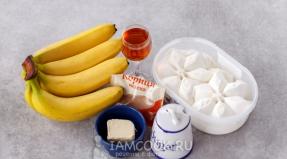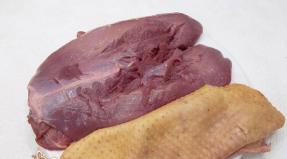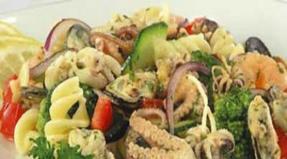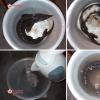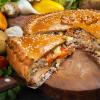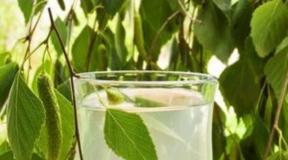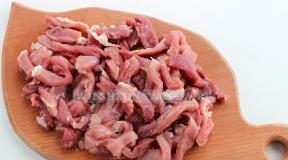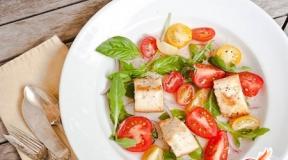Apricot kernel: benefits and harms. The ideal solution to improve health and find beauty is pomegranate seeds
We tend to see health benefits in the most unexpected things. One of the most popular ideas of this kind is the benefits of fruit seeds.
Many believe that fruit pits and seeds contain valuable substances - it’s not for nothing that cosmetologists value so much apricot and peach kernel oils, and nutritionists extol the wonderful properties of grape seed oil. Of course, few dare to eat a whole peach, but often for reasons of benefit, for example, they make jam without removing seeds from fruits and berries.
It turns out that the benefits of fruit seeds are a moot point. Firstly, the kernels of many plants of the plum genus contain a substance hazardous to health: “The kernels of the seeds of apricots, peaches, apples, cherries contain amygdalin glycoside, which is broken down in the stomach with the release of hydrocyanic acid, which is a poison,” explains Irina Russ, nutritionist, endocrinologist. Amygdalin is what gives apple seeds their bitter taste. Of course, the concentration of toxic substances in them is very small, but this fact should not be neglected. “At the same time, apple seeds are a source of many vitamins, minerals, and most importantly, iodine,” says Irina Russ, “however, you can eat them no more than five or six pieces a day.”
The situation is also contradictory with other bones.
Grapes and pomegranate
“The seeds of pomegranate and grapes, if they are not chewed, are not digested in the gastrointestinal tract, but they can increase peristalsis, acting like fiber,” says Irina Russ. In addition, grape seed contains many vitamins and plant phenolic compounds - very strong antioxidants. True, if you just chew the bones, these substances will not be absorbed very well - it is much more useful to make tinctures. Pomegranate kernels are rich in unsaturated fatty acids and vitamin E.
However, you can eat these seeds only if you do not have diseases of the gastrointestinal tract, otherwise they can cause an exacerbation. In addition, take care of tooth enamel: hard bones are also not useful for it.
Cherry
Swallowing a cherry pit is probably only by accident: it is unlikely that anyone will deliberately eat something absolutely inedible. However, if this happens, you should not panic: despite the content of hydrocyanic acid, in a small amount the bones are not dangerous.
You can also cook cherry jam without removing the seeds: under the influence of high temperatures, amygdalin is destroyed. For the same reason, one should not be afraid to make clafoutis with cherries and cherries the way the French do it, without removing the core.
Peach
Peach kernels are difficult to come by, and if you manage to do so, you will find that they are completely tasteless. Due to the high content of amygdalin, they are bitter, so there is really no need to eat them. Another thing is peach seed oil. It is rich in omega-3, omega-6, and omega-9 polyunsaturated fatty acids, and since amygdalin is soluble in water, but not in fat, hydrocyanic acid is not present in the oil, and it can be added to salad dressings.
Apricot
The most edible bone is insidious: in addition to polyunsaturated fatty acids, minerals and vitamins, it also contains the notorious hydrocyanic acid. Eating more than ten delicious nucleoli is not worth it.
But heat treatment makes apricot kernels completely harmless, which is why they are so often used in the cuisine of the Transcaucasus and the Middle East: it is enough to ignite the kernels in the oven and you can mix them with honey and dried apricots or eat them just like that. Yes, and Europeans have found a way to use apricot pits: bitter kernels are used to flavor jams and sweets (two or three nucleoli are enough) or to make Italian amaretto cookies.
The apricot is a fruit whose country of origin is still unknown. So, some scientists suggest that the plant originally grew in Armenia, others lean towards Kazakhstan. Now the trees of this fruit can be seen where there are appropriate climatic conditions for them.
Some information about the fruit
For several hundred years, a number of varieties of this plant have been bred, which are well adapted to the frost-resistant climate. Trees can be up to a hundred years old. They can be seen in warm countries. Apricot fruits are somewhat reminiscent of peach, which are also similar in color. The orange color of the fruit indicates that it contains carotene, which is necessary for the human body. It contains useful trace elements, vitamins, tannins, phosphorus, calcium, essential oils.
As a rule, apricots are eaten fresh or dried. It should be noted that in any form, the fruit is very useful and retains all the nutrients.
What is the composition of apricot kernels?
One of the main components of the fruit is amygdalin. Today, there are a lot of questions and opinions about whether the treatment of cancer with apricot kernels is a myth or a reality. So, the content of B17 in the fruit is compared with the chemotherapy procedure, but not harmful to health. Therefore, most people have a question: "Apricot kernels for cancer - how to take them in the fight against this disease?". You will see the answer to this question in our article.

In addition, the bone of this fruit contains such components as proteins and acids, phospholipids and essential oils, various microelements.
Also, amygdalin itself contains which harms the human body when consumed in very large quantities. One of the interesting facts about kernels is that the more bitter they taste, the more toxic substances they contain. In this case, it is advised to take bones with a sweet component, as they are the most useful and valuable in quality.
Can you eat apricot kernels?
There is a judgment that states that there was a Tibetan settlement. Here, the inhabitants took several kernels of fruit every day. As researchers know, none of the settlers had cancer. And women gave birth even at the age of 55, which was not outlandish and unhealthy for them, despite their rather large age.

According to statistics, those who consume these components of the fruit, even in adulthood, have excellent physical condition and mind.
Regarding the effectiveness of cancer treatment with apricot seeds, traditional medicine has been using them for quite a long time. And not only with this disease. But, as well as pneumonia and asthma. In addition, apricot kernels are an excellent way to satisfy hunger. A few pieces are enough for a person to work actively without thinking about food for three hours.
Why do apricot pits have a bitter taste?
Having tried several types of grains of this fruit, it can be noted that some of them have a sweetish aftertaste, while others are vice versa. But even in the first case, the presence of bitterness is felt.
Scientists say that this is a consequence of the presence of toxic substances in them. Only their concentration is different. In the case when the apricot kernel is sweet with a slight bitterness, it can be eaten in the absence of contraindications.
If you come across a bone with a very bitter content, then you do not need to eat it. Since it is this terrifying aftertaste that reports a large amount of hydrocyanic acid in it.
What is the difference between almonds and apricot kernels?
It would seem that they are one and the same. But by telling a representative of Central Asia about this, you will make them smile. Yes, because they are absolutely two different things, although they are similar in composition of useful substances.

The difference between them is as follows:
- the kernel of the almond is elongated and oval, while that of the apricot is slightly flattened and roundish;
- almonds are larger than the grain of our fruit;
- the color of the first is more saturated compared to the first core.
Almonds are more popular than apricot pits. They can be purchased at any chain stores. It also contains slightly more beneficial trace elements than orange fruit kernels.
Apricot kernels: benefits and harms, useful properties
The kernels of this fruit are considered interesting in various discussions by scientists because of its heterogeneous composition. Most people, after eating the pulp of an apricot, throw away their seeds along with the contents, not understanding their benefits.
The kernels of this plant are used both in perfumery and in medicine and cooking. They are used for pneumonia, bronchitis, apricot pits is not a well-studied topic, therefore, in traditional medicine, the substance is used in small quantities.
As a rule, culinary specialists use kernels to decorate a dish and to give it a specific taste.

In folk medicine, urbech is made from this content of apricot seeds. It consists of grains, honey and butter. This remedy is very good for colds and is used to strengthen the immune system.
The harm of apricot kernels is that it contains a lot of sucrose. For this reason, people with diabetes and those prone to obesity should not use it. Another contraindication is the presence of cyanide in it, which later turns into hydrocyanic acid. By eating apricot pulp and nuts, this poison can be neutralized. But when consumed in large quantities, you can get food poisoning.
Also, doctors do not recommend using this product for pregnant women, people with thyroid problems, with liver diseases. Children should not eat more than ten kernels per day, provided that they do not have allergies. In this case, you need to contact a specialist and take an antihistamine.
Apricot kernels for cancer: how to take them for prevention and in case of illness?
The amygdalin and pigmatic acid contained in the fruit kernels are those substances that have a detrimental effect on cells affected by oncology. Scientists have proven that moderate consumption of grains leads to inhibition of the growth of affected tissues and their regeneration.

Despite the fact that some researchers talk about the dangers and likelihood of toxic nuclear poisoning, this phenomenon is rare. As mentioned, they should be taken in small quantities. Apricot kernels for cancer, how to take them? First, kernels are needed only from wild plants that grow away from the road. Secondly, for the effectiveness of apricot grains, they are destroyed before direct use. You only need raw kernels. And the brighter their color, the more useful substances they contain.
How much apricot kernels for cancer how to take? The number of grains depends on the mass of the human body. There should be one core per 5 kg. If the patient has unpleasant symptoms, then the number of grains should be reduced. They must be eaten on an empty stomach.
Is it possible to eat apple seeds, some people ask this question when they start eating tasty and juicy fruits. An apple in itself is a very valuable and healthy fruit, and this product comes in a variety of varieties and ripening periods.
Bones from apples, the benefits and harms of which have been the cause of disputes for many experts for several years, can be included in your diet, but subject to certain rules.
The internal composition of the seeds from apples
Apple pits contain the following beneficial elements in their composition:

- fatty oils, up to 35% of the total bone mass;
- protein;
- sucrose;
- vitamin B17. Such a vitamin, also called letril, is a very rare and important trace element. The daily norm of the element is in 4-5 bones;
- mineral elements, iodine with a daily norm in 10 bones and potassium with a content in the bone of 200 mcg.
Benefits of apple seeds
Apple seeds contain vitamin B17, quite important for humans, letril, which is a rare but useful trace element. This vitamin slows down the spread of tumor cells, so leading oncologists recommend the use of apple seeds as a preventive measure for oncological diseases.
Vitamin B17 increases the activity of the body and improves its general condition. A person who receives such a vitamin in the required dose feels and looks much younger than their peers.
Apple seeds are high in iodine. With a lack of such a trace element, a person is characterized by constant headaches, distracted attention, memory loss, frequent changes and deterioration in mood. To equalize the iodine content in the patient's body, the attending physicians prescribe to eat up to five apple seeds per day in order to take part of the daily intake of the element.
However, apples are not the only source of iodine in the body, so you need to include other foods in your daily diet that allow you to bring the iodine content to normal.
 When absorbing juicy apples, it can be cut in half and fresh seeds removed from it. After these seeds need to be crushed in any available device to a powder. The prepared powder can, as an option, be mixed with honey of any collection in a ratio of one to two. After that, such a mixture can be safely added to kefir, yogurt, cereals, or even taken as a separate supplement in the amount of one teaspoon per day. The daily norm for grain is five or six pieces.
When absorbing juicy apples, it can be cut in half and fresh seeds removed from it. After these seeds need to be crushed in any available device to a powder. The prepared powder can, as an option, be mixed with honey of any collection in a ratio of one to two. After that, such a mixture can be safely added to kefir, yogurt, cereals, or even taken as a separate supplement in the amount of one teaspoon per day. The daily norm for grain is five or six pieces.
When studying the properties of seeds from apples, useful substances were discovered in their composition that help in the fight against wrinkles. After this discovery, the bones were widely used in cosmetology in the manufacture of creams, scrubs and face masks.
To prepare apple cosmetics at home, you need to cut the whole apple, including the seeds, and only the rough flaps from the core of the fruit should be removed.
Apple seeds, due to their great biological strength, are widely used in modern seed therapy courses in the treatment of internal organs of patients. So, for example, during the course of su-jok treatment, apple seeds are applied to the biologically active points of the patient's palms and feet, which are responsible for the state of one or another internal organ.
Harm from apple pits
In addition to the benefits, apple grains, if used incorrectly, can do great harm. This is due to the fact that fruit seeds contain a very dangerous substance - amygdalin glycoside, which turns into hydrocyanic acid in the human stomach. Such an acid - called cyanide - is a strong poison.
However, the immune system of a person with an unweakened and healthy body is ready to cope with a small amount of such a poison. Therefore, with a normalized intake of apple grains, they will not bring harm, but only benefit.
Now it’s clear why you can’t eat apple seeds in large quantities. Uncontrolled intake of grains from apples can lead to food or even chemical poisoning with a possible fatal outcome.
The main symptoms of food poisoning with hydrocyanic acid are signs:

- Problems with the respiratory tract, turning into suffocation.
- Sudden changes in blood pressure and heart rate.
- Profuse vomiting.
- Intolerable headache.
- Unconscious state.
With such poisoning, it is necessary to call a team of doctors and urgently rinse the stomach. Failure to provide timely qualified assistance can lead to death.
It should be borne in mind that the poison in the bones of apples decomposes during heat treatment, therefore, compotes, jams and other dishes into which fruit seeds fall do not pose any danger to human health.
It should be remembered that tinctures and liqueurs made at home from fruits with stones without heat treatment can lead to food poisoning.
Contraindications
 Seeds from apples, although they are a good source of iodine, are contraindicated in women during pregnancy and breastfeeding. And there are objective reasons for this. Expectant mothers are very susceptible to all harmful and toxic substances, the influence of which can cause a deterioration in the general well-being of a woman, headache and severe toxicosis.
Seeds from apples, although they are a good source of iodine, are contraindicated in women during pregnancy and breastfeeding. And there are objective reasons for this. Expectant mothers are very susceptible to all harmful and toxic substances, the influence of which can cause a deterioration in the general well-being of a woman, headache and severe toxicosis.
To maintain normal iodine content in a woman in a position that is important for the future mother herself and the growing fetus, it is necessary to include fruits and products with iodine in the diet, as well as vitamin complexes prescribed by the attending physician.
Toddlers, with their characteristic developing immune systems, cannot fight even a minimal amount of poisonous acid. Therefore, children should generally be protected from the consumption of fruits with stones. Therefore, such grains should not be eaten by women during breastfeeding.
The juicy pulp of apricots is saturated with vitamins and substances that are important for our health, but is it worth eating apricot seeds, the benefits of which cause so much controversy?

Photo of apricots
It is no coincidence that apricot is popularly called the “fruit of health”, because its pulp is saturated with vitamins B1, B2, B9, E, A, P, PP, C, N. There is a lot of iodine, iron, magnesium, sodium, potassium and phosphorus in it, there are also sulfur, calcium and silicon. In addition, apricot fruits contain malic, citric, salicylic, tartaric acids, starch, inulin, dextrin, tannins, pectin and sugars.
Delicious apricots are quite suitable for those who adhere to a dietary diet, since the calorie content of fresh fruits is quite low (100 g contains 43 kcal). Dried apricots are much more high-calorie - more than 230 Kcal per 100 g, but there are more minerals in it than in juicy apricot pulp.
Video about apricot kernels
Despite the low calorie content, it should be borne in mind that garden apricots are not inferior in sugar content - up to 27% in fresh fruits. In the dried pulp, the percentage of sugars increases two to three times. Therefore, with a predisposition to diabetes, one should be very careful about the use of apricots, and even more so dried apricots.
Regular consumption of fresh apricots has a very beneficial effect on the body, allowing you to effectively cope with various health problems. Juicy fragrant apricots help:
- keep the cardiovascular system in good shape;
- remove cholesterol from the body, as well as salts of heavy metals;
- prevent the development of thyroid diseases;
- regulate the processes of hematopoiesis;
- eliminate swelling;
- increase hemoglobin in the blood;
- stimulate brain activity and improve memory;
- prevent beriberi;
- deal with constipation;
- lower blood pressure;
- improve the functioning of the intestines, liver, gallbladder;
- regulate the acidity of the stomach;
- cope with dry cough and stimulate sputum production;
- quench.

photo of apricots
Based on the listed healing properties, apricots are recommended to be included in the diet of pregnant women, young children, hypertensive patients, those who suffer from obesity, anemia, constipation, cardiovascular or renal diseases, as well as cancer patients in addition to maintenance therapy.
To improve health, it is enough to consume 100-150 g of fresh apricots per day. Just do not eat them on an empty stomach or after meat dishes, as this will have a bad effect on digestion.
Apricot juice is absorbed faster and more efficiently - it is especially recommended for expectant mothers and children to drink to meet the daily requirement for vitamins. So, 150 ml of juice is enough to replenish the supply of carotene in the body, and to combat puffiness, you need to drink 100 ml of juice up to eight times a day.
Dried apricots are much superior to beef liver in their beneficial effect on the process of hematopoiesis. Dried apricots should be used for heart rhythm disturbances, anemia, hypertension, and also for constipation - vegetable fibers cleanse the intestines remarkably.

photo of dried apricots
Everyone's favorite apricots, the benefits and harms of which have been well studied by experts, are not as harmless as they seem. So, if you have gastritis with high acidity or, even worse, a gastrointestinal ulcer, you should abandon fresh apricots in favor of a more gentle apricot juice. And in case of pancreatitis and other liver problems, use the fruits with great care.
Although apricots are very tasty and healthy, even healthy people should not get carried away with them: sometimes ten fruits are enough to start diarrhea (especially if you drink them with cold water). In addition, from excessive consumption of apricots, dizziness, lowering blood pressure, a decrease in heart rate and respiratory depression are possible.
As mentioned above, apricots are saturated with sugars, and for this reason are contraindicated for diabetics. Moreover, you can not use not only dried apricots, but also the fresh pulp of the fruit.

A picture of apricots
Apricot kernel - health benefits and harms
Many people know how poisonous apricot pits can be, beneficial features are not known to everyone. But in oriental medicine, apricot kernels have long been used as a miraculous remedy that saves from various diseases of the upper respiratory tract: from bronchitis, tracheitis, bronchial asthma, laryngitis. It is enough to extract the nucleoli from twenty seeds, dry them and grind them thoroughly, and then take the resulting powder four times a day in a teaspoon, washed down with milk or tea.
Video about apricot kernels
But if you use apricot seeds immoderately, their benefits will come to naught due to amygdalin, a poisonous component that turns into hydrocyanic acid in the digestive organs, which is very dangerous for the body. Apricot nucleoli contain only 12% amygdalin, so they are not as dangerous as those that are not eaten raw at all.
For those who do not want to take risks, more suitable apricot oil obtained from the bones. Its composition is unique: linoleic, stearic, palmitic, myristic and oleic acids, phospholipids, magnesium and calcium salts, vitamins E, C, A, B. The benefits of the oil are evidenced by the fact that it is widely used in the production of various ointments, creams and children's cosmetics. Apricot seed oil perfectly moisturizes the skin, prolonging its youth, eliminates dead skin particles and heals cracks well.
Many remember from childhood that in no case should you eat apricot pits, otherwise you can get poisoned! The bitter kernel contains hydrocyanic acid, which can cause serious damage to health. Due to an unfounded belief instilled at a young age, we often throw away an edible product that brings invaluable health benefits.
Even in ancient China, they knew what healing properties apricot seeds have. Bitter nuts were available only to imperial families. Today you can buy seeds in the market or in stores. But is this purchase safe?
We offer to understand what apricot pits are. Benefit and harm, what more?
Can you eat apricot kernels
Actually, this is one of the main doubts about apricot pits that needs to be dispelled. Their use is not only permissible, but necessary! At the same time, so that bitter seeds do not harm the body, remember the safe daily allowance - no more than 20 grams for adults (about 10 pieces), and 10 grams for children (about 5 pieces). It's all about hydrocyanic acid, which is part of the nuclei. Small doses are safe for health, and consumption of more than 40 grams of kernels will lead to serious intoxication.
It is a mistake to assume that blanks with whole apricot nucleoli are harmful. Thermal treatment neutralizes the effect of hydrocyanic acid, but does not completely eliminate it. You can eat any amount of apricot pulp from jam or compote, with nucleoli you should not exceed the norm of 10 pieces.
Apricot kernels description and composition
Apricot kernels - for them you will have to work hard to carefully extract the contents from a dense shell surrounded by sweet, fleshy pulp. By the way, due to the laboriousness of the process, in ancient China, only representatives of imperial families ate whole nucleoli. Outwardly, the seeds are similar to almonds, but differ significantly in taste, and most importantly, in properties.
Apricot kernels, like most nuts, have their own special taste. But the bitter taste and anti-cancer effect is the merit of amygdalin, which you will learn about a little later.
How to distinguish almonds from apricot kernels
Due to the resemblance, buyers sometimes fall for the tricks of sellers and buy apricot kernels at the price of almonds. Main differences:
- Apricot kernels are smaller in size, both in length and volume;
- The seeds have a rounded shape, while almonds, on the contrary, have a more pronounced sharp tip;
- The apricot kernel is slightly flattened on the sides. Almonds have a smooth, evenly tapering surface;
Nuts are also similar in taste. There are both varieties of apricots with sweet seeds, and bitter almonds - it is better to focus on the appearance. The most important difference is not in the cost of products. Overeating almonds will not lead to poisoning, but the nucleoli can, and quite severely. Therefore, it is so important to understand what is in front of you: apricot kernels or almonds.
Chemical composition
The composition of the apricot kernel determines their benefits and harms. The seeds contain:
- Vitamins A, B, PP, C, F;
- Tocopherols - substances that prevent premature aging processes;
- Essential oils;
- Phospholipids that improve liver function;
- Unsaturated and saturated acids;
- Essential and non-essential amino acids
- Natural pigments, including carotene;
- Trace elements: magnesium, iron, potassium, calcium, phosphorus, sodium;
- Vitamin B17 (amygdalin), apricot kernels in connection with it have earned the title of "natural chemotherapy". When the vitamin comes into contact with the affected cells, cyanide and benzaldehyde are released, as a result of which the development of an oncological tumor is inhibited. In a small amount, vitamin B17 is safe for healthy cells. B17 gives the stone a bitter taste. The more bitterness, the higher the concentration of the vitamin. It is found in plum, apple, and cherry kernels, in bitter almonds, millet and flaxseed.
Product calorie content
Apricot kernels have a high calorie content - approximately 440 kcal per 100 grams. The energy value and a large amount of fat do not allow us to call the product dietary. But even the fats from the seeds are incredibly healthy. About 30% of the composition is assigned to oleic acid, which provides the body with energy and promotes the absorption of other fats. Linoleic acid, which occupies about 11%, regulates cholesterol levels and ensures the proper functioning of the cardiovascular system and neutralizes the action of free radicals.
100 grams of apricot seeds carry 45.4 g of fat, 25 g of protein, 2.8 g of carbohydrates, 2.6 g of ash, 5.4 g of water.
Benefits of apricot kernels
The healing properties of apricot kernels have been discovered for a very long time. For example, in ancient China, seeds and products based on them were used to treat skin diseases and inflammation of the musculoskeletal system.
The beneficial effect of apricot and its seeds was clearly confirmed by the people of the Hunza tribe - well-known centenarians. The tribe lives in northern India, in rather harsh climatic conditions. The basis of the Hunza diet is apricot and its seeds, which serve as raw materials for the production of valuable oil. Vegetarianism and the constant presence of apricot kernels in the diet allows people to live for more than 120 years!
Today, the apricot kernel is used in the production of medicinal and cosmetic preparations, and traditional medicine uses it in its healing recipes. On the body, regular use of apricot kernels has: anti-inflammatory, anti-cancer, antiseptic, antioxidant; immunomodulatory, anthelmintic, regenerating effect
The beneficial properties of the bones will be fully manifested if they are fresh, follow the expiration date. Seeds can be consumed lightly roasted, but better raw.
For men
For women
Apricot kernels are a source of healthy fats responsible for women's health and beauty. Unsaturated fatty acids slow down aging, restore hormonal balance, have an antioxidant effect, normalize hematopoiesis, improve the state of the cardiovascular system, and support the nervous system. Oils, vitamins and minerals are in high concentrations, so it is difficult to say which organs remain "deprived" of the positive effect of seeds.
Apricot kernel oil is in demand in the field of cosmetology.
The benefits of apricot kernels in diseases
As already mentioned, treatment with apricot kernels has been known for a long time. The product effectively copes with many painful conditions:
- Milk extracted from apricot kernels promotes coughing and sputum discharge, fights whooping cough, bronchitis and many diseases of the upper respiratory tract;
- Ground and brewed apricot kernels cope with cardiac arrhythmia;
- Eating raw seeds on an empty stomach is an excellent remedy for combating helminths.
- The oil normalizes the functioning of the gastrointestinal tract, eliminates bloating, prevents constipation, normalizes the pancreas and gallbladder, and alleviates the condition of hemorrhoids;
- With gastritis and ulcers, the oil gently envelops and protects the inflamed mucous membranes, minimizes pain;
- The vitamins included in the composition inhibit the action of pathogenic microorganisms, stop dysbacteriosis;
- The anti-inflammatory and regenerating effect of apricot kernel oil is especially noticeable in kidney disease (in particular, nephritis) and liver cirrhosis;
- The oil fights skin and joint inflammation;
- A rich vitamin and mineral composition eliminates beriberi, normalizes hemoglobin levels, improves hematopoiesis, nourishes the heart, and has a positive effect on the condition of the skin, hair and nails. One of the most delicious and healthy recipes for coping with beriberi is apricot pits grated with lemon and honey. To do this, 20 grams of seeds, lemon with zest are crushed with a blender or meat grinder and mixed with 3-4 tablespoons of honey. The mixture is recommended to take 1 teaspoon on an empty stomach.
Of course, in folk medicine, apricot kernels are associated with a natural cure for cancer. There are examples in folk medicine when the regular use of apricot kernels stopped the development of oncology. There is no official confirmation of the effectiveness of treatment in scientific medicine yet.
The use of apricot kernels
Apricot kernels have found many uses, especially in medicine, cosmetics and cooking.
In medicine
Despite the lack of official confirmation of the inhibitory effect of apricot kernels on cancerous growths, drugs and dietary supplements based on this product are increasingly appearing. Pharmacies sell ground kernels, extracts and oils of apricot kernels, vitamin B17. Such funds should be considered as prevention and support in the fight against oncology.
In cosmetology
In the 15th-16th centuries, oil extracted from apricot kernels was worth its weight in gold. Of course, now it can be purchased ten times cheaper, but this does not reduce the unique and beneficial effect, especially in the field of cosmetology. Apricot oil is added to shampoos, creams, scrubs, masks and lotions, used as an independent remedy.

Transparent oil with a delicate nutty aroma nourishes the skin, maintains elasticity, eliminates fine wrinkles and skin creases. It promotes accelerated healing of wounds, minimizes skin inflammation. Despite the fat content and density, the oil falls on the skin in a thin, almost imperceptible layer, without interfering with skin breathing. Masks with apricot oil stimulate growth and strengthen weakened hair, making it smooth and silky.
In cooking
Bitter grains have found their place in cooking. To give a delicate apricot-nutty flavor, ground seeds are added to pastries, ice cream, desserts, sour-milk products and sweet salads. And jam with whole nucleoli is a real work of culinary art.
Oil, on the contrary, has not found extensive use for cooking, it is rarely used for dressing salads.
You can store apricot kernels in shell or in peeled form. As a rule, a hard shell prolongs the shelf life. Over time, fat oxidation occurs and the concentration of hydrocyanic acid increases significantly, so it is not recommended to store the product for more than one year. Seeds must be dried, put in a container with a tight-fitting lid and put in a kitchen cabinet, protected from direct sunlight.
Contraindications and harm
Paracelsus said: “Everything is poison, nothing is without poison, and everything is medicine. Only a fraction makes a substance a poison or a medicine. This wise saying most accurately reflects the invaluable benefits and possible harm from apricot seeds.

First, you should always remember about the norm - no more than 40 grams per day. It is not recommended to consume more than 1 kernel per 5 kg of human weight.
Secondly, only fresh seeds with a good shelf life are suitable for food. It is strictly unacceptable to eat old and rancid bones.
Thirdly, heat treatment of the product is recommended (frying in a pan or drying in the oven). At temperatures above 40 degrees, it destroys amygdalin, which means that its concentration and the risk of intoxication decrease.
Neglect of the recommendations can lead to poisoning, which manifests itself approximately 5 hours after consuming the product. A person's activity decreases, severe headache, nausea, stomach cramps, and abdominal pain begin. Breathing becomes irregular. In severe cases, convulsions, fainting, or acute heart failure may occur.

